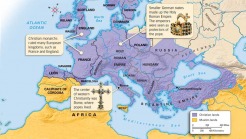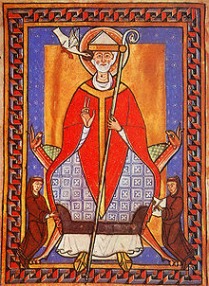Kings vs. Popes
The Power of the Popes & Kings

In the later Middle Ages, popes and many European kings gained more power and controlled the European society. The Popes were believed to be God's representative on Earth and so, he had power over everyone. The pope will decide everything about the church and could punish anyone who offended it. If the pope felt someone was working against the church, he could punish the person in many way. For very serious offense, the offender could be excommunicated, cast out from the church. Many popes had great religious and political power and were looked as a leader by most of the Europeans. Kings and monarchs ruled almost all the countries in Europe. However, many kings had very little real power because they had to gain their nobles' support. In the later Middle Ages, some kings began to take full control of their country especially for England and France.
Clash of Power

In the mid-1000s, the popes began to increase their authority over the eastern church. Bishops who did not recognize the pope as the head of Christianity were excommunicated by the pope. This eventually led to the split between the Roman Catholic Church of western Europe and the Orthodox Church of Eastern Europe. However, the pope became the most powerful figures in Europe. As the popes worked to increase their power, they often came into conflict with kings especially with the Holy Roman Empire. In 1073, a new pope came to power and his name was Pope Gregory VII. He disapproved of a bishop chosen by the Holy Roman Emperor Henry IV. Henry became vey angry when pope questioned his authority and tried to convince his bishop to remove the pope as pope. In response, Pope Gregory excommunicated Henry and convinced the German nobles to overthrow Henry. Fearing to lose his power, Henry begged the pope for forgiveness and the pope eventually forgave him. The popes and the Holy Roman Emperors continued to challenge each others' authorities. In 1122, Pope Calixtus II and Holy Roman Emperor Henry V agreed that church officials would choose all bishops and abbots but, they still had to obey the emperor. However, the popes and kings continued to fight for powers in Europe.
